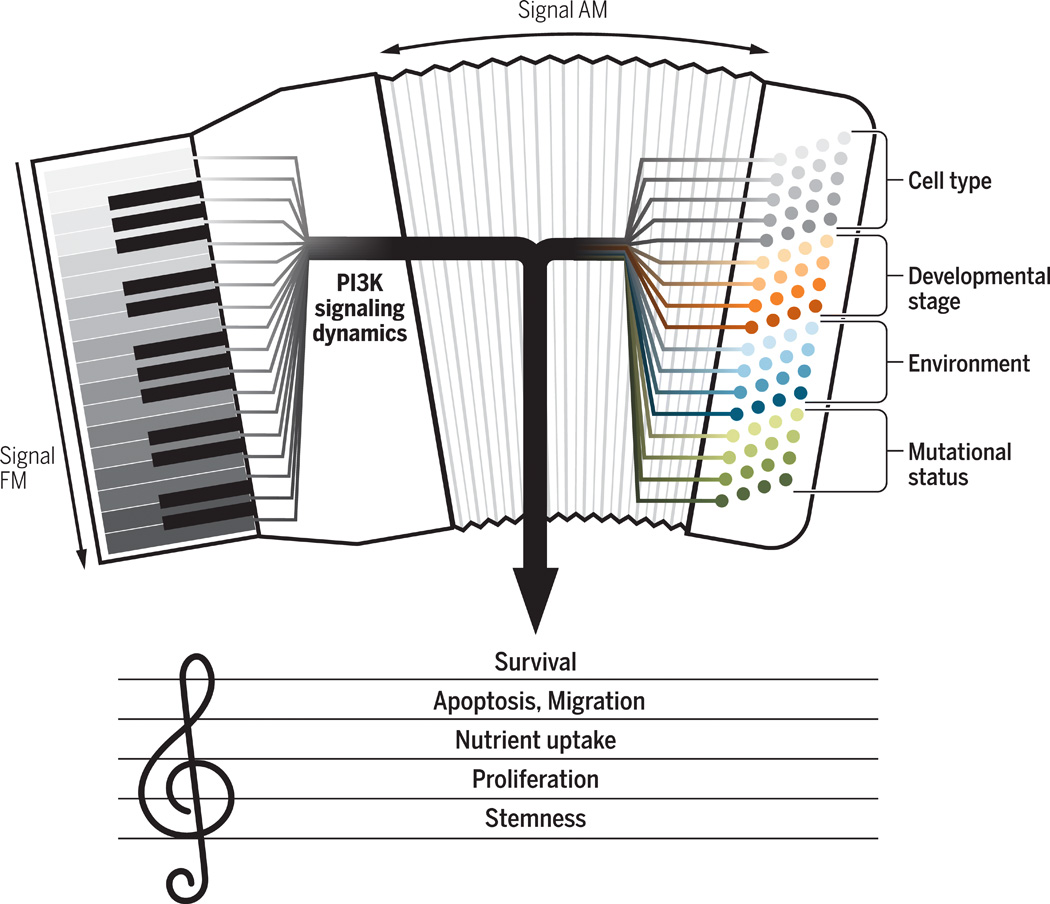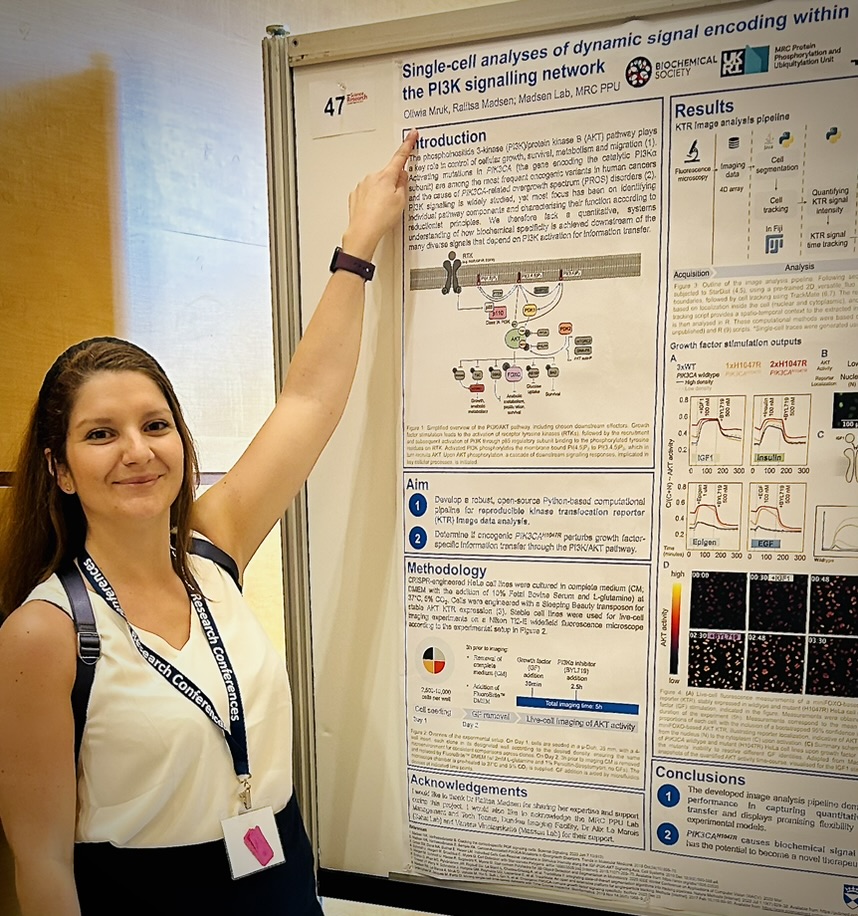We are delighted to announce that Ralitsa Madsen has been awarded a UKRI Future Leaders Fellowship, one of the UK’s flagship fellowship schemes for early career investigators. Ralitsa transferred her Henry Wellcome Fellowship to the MRC PPU from Bart Vanhaesebroeck’s laboratory at UCL in May 2023 to take up an Independent Investigator position and was promoted to Principal Investigator at the School of Life Sciences in March 2024.

The award of the Future Leaders Fellowship will allow Ralitsa to establish an innovative programme of research to characterise in detail the intricate circuits controlled by the PI3K pathway to regulate cellular decision making. Ralitsa will focus particularly on how mutations that activate the PI3K pathway in different cells and tissues impinge on this pathway and cause diverse disorders such as cancer or human overgrowth syndromes. Ralitsa says that “The impact of PI3Ka mutations is analogous to a malfunctioning accordion, with affected cells no longer ‘playing the right tune’ given a specific input. Yet, the solution is not simply to turn the system off which is what current therapeutics do. My group wants to repair the system, enabling it ‘to play the right tune’ once again."
Ralitsa will develop an innovative stem cell-based experimental workflow that allows systematic measurements of the PI3K signal and its variability in different cells over time. Working together with leading experts in mathematics and physics, she will use her experimental measurements to build predictive, dynamic maps of cellular decision making, both in the presence and in the absence of PI3K malfunction. Aided by computational simulations, she will then ask what specific perturbations are likely to shift a cell with a PI3K malfunction from a disease-driving to a normal state. The resulting predictions will be tested experimentally and adapted to patient-specific disease models to enable so-called "state-gating" therapies.
The value of the funding that Ralitsa has received is £1.8 million and will fund her laboratory for up to 4 years in the first instance, with extension for a further 3 years. Excitingly this funding also includes the costs to purchase a Cytometry by Time Of Flight (CyTOF) XT instrument, which will allow Ralitsa to quantify signalling outputs with single-cell resolution using optimised antibody-based detection of multiple cellular components simultaneously. This is only the second CyTOF instrument in Scotland, and the only XT version which allows for high-throughput, automated sample processing. Ralitsa will open it up to other researchers in Dundee and other institutions to ensure that this vital item enables research advances more broadly.
Ralitsa stated “I am humbled by and incredibly grateful for receiving a UKRI Future Leaders Fellowship. It is a career-changing event and one that will provide my research group with the time and resources required to deliver a step change in our understanding and ability to target a fundamental disease-causing circuit in human cells. As the name suggests, this Fellowship also comes with leadership responsibility. One that I will honour in several ways, including by working tirelessly to champion a healthy research culture; a culture that celebrates rigour and quality over quantity, and one that instils curiosity and passion for learning in our young researchers early on in their academic journeys. Finally, I would like to thank: the Wellcome Trust whose generous support during my PhD and postdoc enabled this achievement; my mentors and colleagues within the MRC PPU, School of Life Sciences and beyond for their support; my collaborators without whom this Fellowship would be impossible; and last but not least, the PROS patient community whose belief in the value of our research keeps our group inspired every single day.”

Dario Alessi, MRC PPU Director stated “I congratulate Ralitsa for the award of this prestigious fellowship. She has worked extremely hard to achieve this, and it is richly deserved. Ralitsa is incredibly talented, and laser focused in unravelling the intricate biology of how the PI3K pathway is regulated at the single cell level to control diverse cellular decisions and how this information can be harnessed to develop better treatments for disorders of human growth and cancer. I am also extremely impressed with the pioneering mathematical, physics and computational approaches that Ralitsa is harnessing with the support of collaborators to understand how biology is controlled at the single cell level. Her work synergises so well with much other on-going research within the MRC PPU and beyond.”
Ralitsa will work in a very collaborative manner with the below groups during her Fellowship:
- Prof Andre Levchenko (Director of Yale Systems Biology Institute) – who will provide key expertise in statistical physics for the reconstruction of cellular decision landscapes from single-cell data
- Prof Krasimira Tsaneva-Atanasova (Director of the EPSRC Hub for Quantitative Modelling in Healthcare & Alan Turing Fellow) – who will provide key expertise in mathematical modelling and large scale data processing
- Dr Sydney Shaffer (Assistant Professor of Pathology and Bioengineering, University of Pennsylvania) – who will provide key expertise in single-cell biology and lineage tracing using her pioneering MemorySeq barcoding system
- Prof Tom Owen-Hughes (Co-Director of the Division of Molecular, Cell and Developmental Biology, University of Dundee) – who will provide key expertise in epigenetics
- Prof Alfredo Quinones-Hinojosa (Jacoby Chair of Neurosurgery at the Mayo Clinic, Florida) – who will provide access to patient-derived cancer models for future testing of state-gating therapeutic predictions.
Ralitsa will start her Future Leaders Fellowship in November 2024, when her current Sir Henry Wellcome Fellowship finishes. She will be looking for an exceptional Postdoctoral Research Fellow to join her group. More information about this upcoming position is available on the Madsen Lab’s website.

